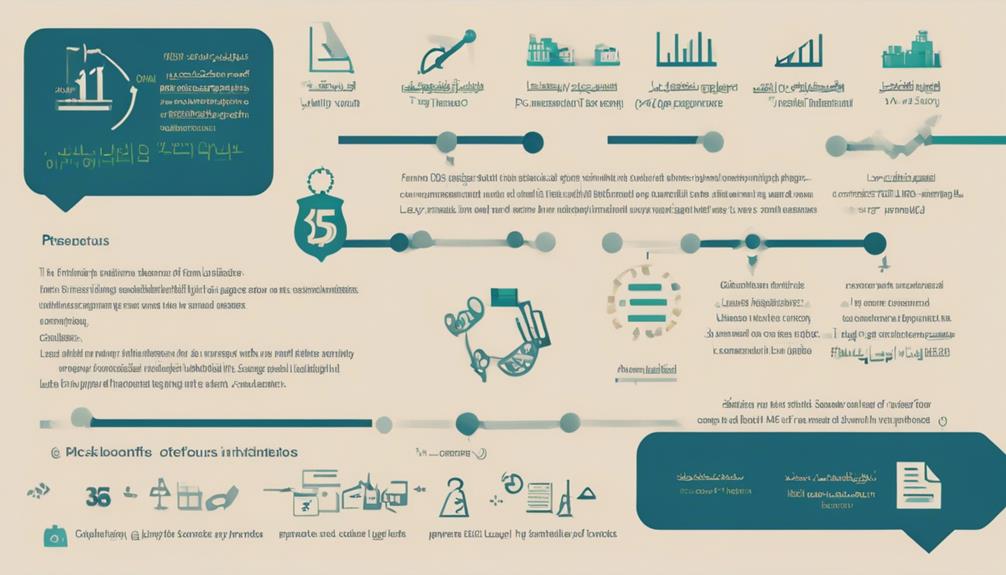Navigating the complexities of end-of-service benefits within the framework of Saudi Labour Law is crucial for every employee. With regulations evolving and varying interpretations existing, it is paramount to understand the nuances to secure what is rightfully yours.
From calculating to leveraging additional benefits, there are strategic avenues one can explore to maximize their entitlements. Proper documentation and negotiation skills can also play a pivotal role in ensuring a favorable outcome.
Stay tuned to uncover key insights on how to optimize your end-of-service benefits and safeguard your financial future.
Understanding Saudi Labour Law

Understanding Saudi Labour Law is essential for both employers and employees to navigate the legal framework governing employment relationships in the Kingdom. This law outlines the legal rights and responsibilities of both parties, ensuring fair treatment and clear guidelines for all. Saudi Labour Law covers various aspects, including employee entitlements such as working hours, leave entitlements, and end-of-service benefits. Employers must adhere to these regulations to provide a safe and conducive work environment, while employees must understand their entitlements to ensure they are not being taken advantage of.
Within Saudi Labour Law, employees are entitled to a range of rights, including protection from discrimination, fair wages, and safe working conditions. Employers are responsible for upholding these rights and providing a work environment that complies with the law. Understanding the intricacies of Saudi Labour Law is crucial for both parties to prevent disputes and ensure a harmonious working relationship. By familiarizing themselves with the legal framework, employers and employees can work together to create a fair and productive work environment in accordance with Saudi regulations.
Calculating Your End-of-Service Benefits
Efficient calculation of end-of-service benefits is paramount for both employers and employees in Saudi Arabia to ensure compliance with labor regulations and fair compensation upon termination of employment.
In Saudi Arabia, the calculating formula for end-of-service benefits is typically based on the employee’s years of service. The standard calculation involves multiplying the employee’s last salary by half a month’s salary for each of the first five years of service and then by one month’s salary for each subsequent year. This formula aims to provide employees with a financial cushion upon retirement or termination.
Understanding this calculation is essential for effective retirement planning, as it allows employees to estimate their expected benefits accurately. By planning ahead and considering end-of-service benefits as part of their overall financial strategy, employees can ensure they are financially prepared for the future.
Leveraging the calculating formula for end-of-service benefits can contribute significantly to long-term financial security and stability after leaving employment.
Leveraging Additional Benefits

Maximizing end-of-service benefits in Saudi Arabia extends beyond the standard calculation formula to encompass leveraging additional benefits for enhanced financial security and stability post-employment. As employees consider their future financial planning, it is essential to explore avenues that go beyond the basic end-of-service benefits provided by law. One key aspect to consider is the option of contributing to a retirement savings plan offered by the employer. By participating in such schemes, employees can augment their end-of-service benefits with additional savings that can provide a cushion during retirement.
Furthermore, some companies offer supplementary benefits like healthcare coverage or life insurance, which can contribute to an individual’s overall financial well-being. These extra benefits can significantly impact an employee’s financial stability both during their working years and after retirement. It is advisable for employees to carefully review their employment contracts and company policies to fully understand the scope of additional benefits available to them. By leveraging these extra perks effectively, individuals can bolster their financial security and ensure a more comfortable post-employment period.
Strategies for Negotiating Better Benefits
Employment negotiations can be enhanced through strategic planning to secure improved benefits for employees in Saudi Arabia. When negotiating better benefits, it is crucial to employ effective negotiation tactics to optimize the benefits offered at the end of service.
One key strategy is to research industry standards and benchmarks to understand what benefits are typically provided by employers in similar roles. This information can be used as leverage during negotiations to request benefits that align with or surpass the norm.
Another important tactic is to clearly outline the value that the employee brings to the organization. By highlighting their skills, experience, and contributions, employees can negotiate for enhanced benefits as a recognition of their worth to the company.
Additionally, it is beneficial to approach negotiations collaboratively, emphasizing the mutual benefits of a positive outcome for both parties. This approach can foster goodwill and increase the likelihood of achieving a favorable result.
Ensuring Proper Documentation

To ensure compliance with Saudi labour laws and facilitate smooth processes, proper documentation of employment terms and agreements is essential. Document verification plays a crucial role in safeguarding the rights of both employees and employers. Ensuring that all employment contracts, amendments, or any other agreements are accurately documented and duly signed by both parties is vital. This documentation should clearly outline the terms of employment, including salary, job responsibilities, working hours, and any additional benefits agreed upon.
Proper documentation also serves to protect employees’ benefit entitlements. By maintaining detailed records of salary increments, bonuses, and any other allowances provided throughout the employment period, employees can ensure that they receive their full end-of-service benefits as per the agreed terms. In case of any disputes or discrepancies, having well-documented evidence can help resolve issues swiftly and fairly.
Therefore, maintaining thorough and accurate documentation of employment-related matters is crucial for both employees and employers in Saudi Arabia to uphold their rights and obligations under the country’s labour laws.
Frequently Asked Questions
Can End-Of-Service Benefits Be Transferred to a New Employer if I Switch Jobs Within Saudi Arabia?
Benefit portability during job changes within Saudi Arabia is subject to legal implications. End-of-service benefits may be transferred to a new employer if agreed upon in the employment contract or as per Saudi Labour Law.
Are There Any Tax Implications on End-Of-Service Benefits Received Under Saudi Labour Law?
Tax implications on end-of-service benefits received under Saudi Labour Law can vary based on factors like residency status and length of service. Accuracy in calculating these benefits is crucial to ensure compliance with tax laws.
What Happens to My End-Of-Service Benefits if My Employer Goes Bankrupt or Closes Down?
In the event of employer bankruptcy or closure, employees may face challenges accessing their end-of-service benefits. Bankruptcy protection laws may determine how entitlements are distributed. Closure may trigger compensation rights under Saudi Labour Law for affected employees.
Can I Negotiate for Additional Benefits Such as Health Insurance Coverage or Housing Allowances as Part of My End-Of-Service Benefits Package?
Negotiating benefits such as health insurance or housing allowances can be possible under employment regulations. Employers may consider such requests, but it is advisable to ensure compliance with Saudi Labour Law and have agreements in writing.
How Can I Ensure That My End-Of-Service Benefits Are Accurately Calculated and Paid Out by My Employer?
To ensure accurate end-of-service benefits calculation and payment by your employer, request benefit verification and transparency in calculation. Understand employer obligations under the law and be prepared to seek legal recourse if necessary for fair and timely compensation.
Conclusion
In conclusion, maximizing end-of-service benefits under Saudi Labour Law requires a thorough understanding of the regulations, accurate calculation of entitlements, and leveraging additional benefits.
By employing strategic negotiation tactics and ensuring proper documentation, employees can secure better benefits upon termination of employment.
It is essential for individuals to be proactive in safeguarding their rights and entitlements as they navigate the complexities of the Saudi labour market.










